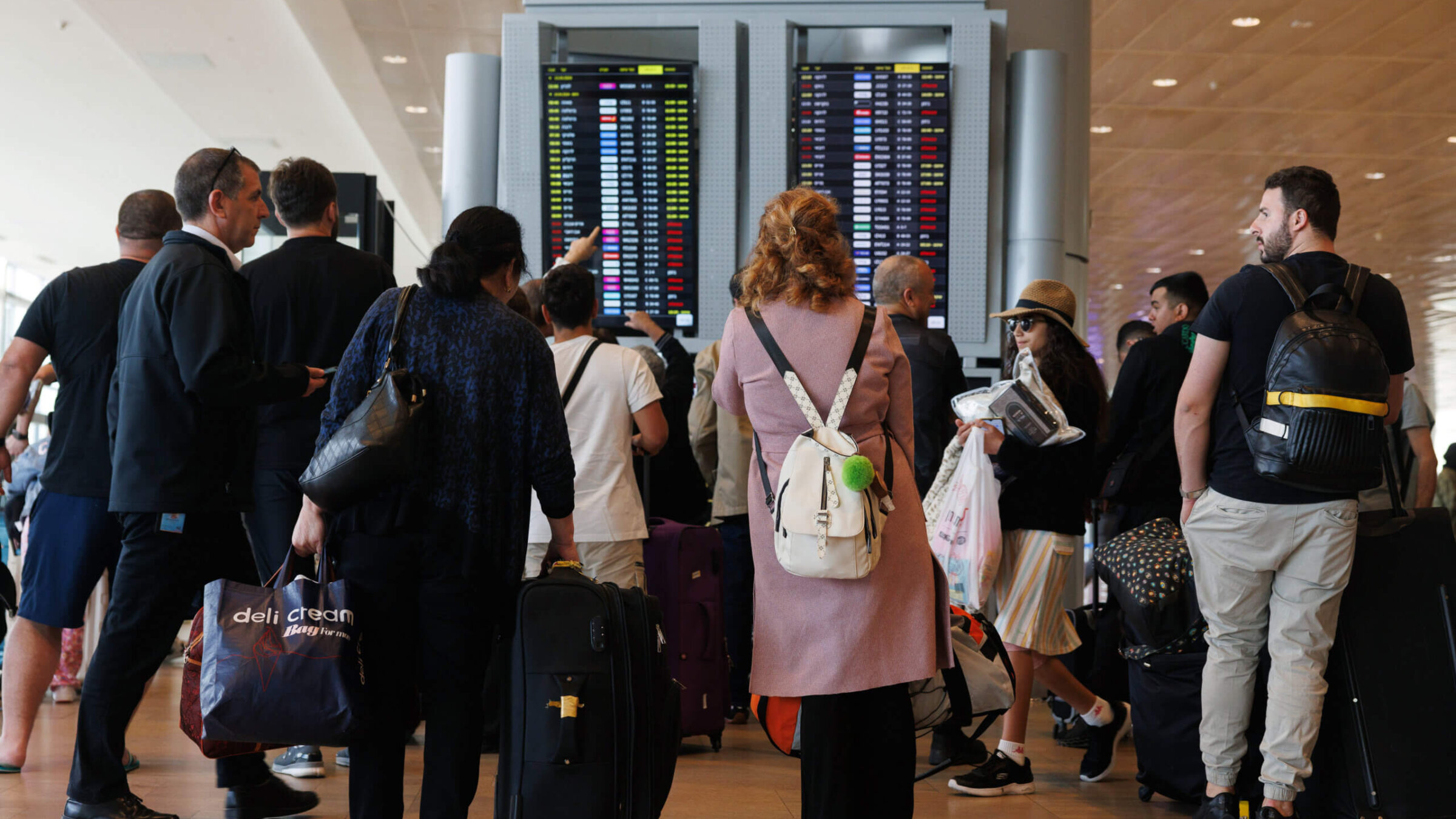Cancellations skyrocket for Passover trips to, from and within Israel
‘My mum is terribly disappointed,’ said one British traveler scared off by Iran’s weekend attack

Passengers check their flight status at Ben-Gurion International Airport on the morning after Iran attacked Israel with drones and missiles on Sunday, April 14. Photo by Kobi Wolf/Bloomberg via Getty Images
TEL AVIV — Lenny Davidman has been organizing Passover resort holidays in Israel for English speakers for about 50 years. He runs Seders, of course, and provides kosher meals, but also offers lectures, activities for kids and nightly entertainment.
Think Borscht Belt, but in the dessert — and with no dinner rolls.
And this year, with many fewer people around the tables.
“Deleted, deleted, deleted,” Davidman said, reading off a roster of 62 of his program’s 260 rooms at the Vert Dead Sea Hotel that will not be filled for next week’s holiday. “I’ve never had so many cancellations in my life.”
Davidman is hardly alone. Tourism experts say Passover travel, which is normally one of the busiest and most lucrative times of the year, is down about 65% from last year, another blow to a segment of Israel’s economy that has been reeling since Oct. 7.
About 200,000 Israelis work in the industry, according to the tourism ministry. Many hotel employees have held onto their jobs, with hotels full of thousands of evacuees from communities near Israel’s borders with Gaza and Lebanon — along with international journalists and volunteers — but tour guides, bus drivers, and others who rely on leisure visitors here have been out of work for months.
Davidman and other tour operators said the Passover cancellations started right after the Hamas terror attack and the war it spawned in Gaza. By March, many travel companies themselves canceled programs, as it became clear that resorts in northern Israel would remain shuttered because of intermittent Hezbollah shelling, and the Israeli government renewed its contracts with hotels housing war evacuees, leaving little or no room for tourists.
Another wave of cancellations came after Israel’s April 1 attack on an Iranian consulate in Syria, as the U.S., Canada, the U.K., India and several European countries advised their citizens not to travel to the Middle East. And since last weekend’s Iranian barrage of drones and missiles targeting Israel — 99% of which were shot down — several airlines have suspended or restricted flights to Israel, including EasyJet and United.
Eli Ruben, a businessman in London who usually celebrates Passover with relatives in Tel Aviv and Herzliya, said he stayed up all Saturday night glued to CNN and much of Sunday consulting his therapist and friends about whether he should make the trip. He opted to stay home.
“My mum is terribly disappointed,” Ruben told me.
Meanwhile, Passover programs in resort destinations outside Israel have had a surge in business, according to Raphi Bloom, co-owner of the United Kingdom-based company Totally Jewish Travel. His website advertises 140 different Passover programs, including weeklong kosher getaways to Thailand, Vietnam, Colombia, Morocco and and Dubai, and Bloom said online traffic has spiked in recent days as people switched from Israel to seemingly safer spots.
“Some people are still heading to Israel,” he told me, “but a lot of travelers are really really nervous about going there right now.”
The situation has also thwarted many Israelis’ plans to go abroad during Passover, when schools are closed, along with many workplaces. The government has urged Israelis not to travel to Turkey, Morocco, Jordan and Egypt, whose Sinai Peninsula was once a popular Passover destination, and advised citizens to not speak Hebrew while abroad due to growing international criticism of Israel and antisemitism.
Those warnings, along with concerns about flight cancellations that could prevent them from returning home, have spooked some Israelis out of leaving the country. Others are desperate to spend their holiday in less stressful places.
“I’m dying to get out of here,” an off-duty Israel Defense Forces officer told me, speaking on the condition of anonymity per military policy. With 10 days leave, he was taking the train to Ben-Gurion International Airport and flying to Spain for a yoga retreat.
Israelis traveling internally have also had to alter their plans. The No. 1 destination for domestic travel was the Upper Galilee, with its lakes, valleys and streams, but that area is now off-limits because of shelling by Hezbollah. The Golan Heights, too, has suffered sporadic attacks from Syria. And the Red Sea resort city of Eilat has been targeted by weapons launched by Yemen’s Houthi rebels.
Most cruise lines are no longer setting sail from ports at Haifa and Ashdod. And the western Negev Desert, where tourists normally flock to see wildflowers in the spring, is scarred by the memory of the Oct. 7 atrocities there and by Israel’s ongoing war in nearby Gaza, where the United Nations estimates that 33,000 Palestinians have been killed and hundreds of thousands are starving.
Davidman, the man who has been running English-speaking Passover programs for half a century, said his American clients who canceled told him they felt unsafe traveling here during wartime. Israelis who backed out, he said, cited reasons like, “My kids don’t want to come,” “My friend’s in a coma” or “We just don’t feel like celebrating.”
His program will remain basically the same as in other years except that one of the evening shows will honor heroes of Oct. 7. “It’ll be a happy performance,” he said, even though one of his band members lost a family member in the massacre.
Kosher Travelers, an Israel-based outfit serving mostly Americans and Europeans, canceled both of its weeklong “Amazing Pesach” programs at resorts in the Galilee — where several IDF reservists were wounded by rocket and drone strikes Tuesday — and consolidated them at a hotel in Jerusalem.
“Some people are still committed to coming to Israel, even if the location changed,” said the company’s CEO, David Walles. Families who wanted more of a spa setting, he said, switched to the company’s program in Rhodes, Greece.
Eran Ketter, a tourism consultant and the head of the Tourism and Hospitality Management department at Kinneret College in Northern Israel, said that half of Israel’s pre-Oct. 7 tourism come from the U.S. and Canada, either on solidarity missions with Jewish groups or to visit relatives. Those trips are down 80%, he said.
Although he was seeing some signs of recovery in March, Ketter said his optimism tanked when Iran sent some 300 drones and missiles toward Israel last weekend.
“That one single night was a major sign to the world showing the abnormality of our situation — that Israel, in effect, is a war zone,” he told me. “That will slow down inbound travel even more for a long, long time.”
Like the London businessman who canceled his Passover trip to Tel Aviv, Joey Freudmann also stayed up watching events unfold in the wee hours of Sunday, “not knowing if a ballistic missile would hit our home or if Pesach was going to go up in smoke.” Freudmann, who lives in Ra’anana, north of Tel Aviv, has spent the last 27 years running Pesach trips, mostly for Americans.
“If there had been casualties, probably everybody would have canceled,” he said. “But everybody’s coming as planned.”
Freudmann had already spent several months uncertain if war evacuees would be out of the spa hotel in Herzliya where he is expecting hundreds of guests next week. Most of the Israelis returned to their homes in the south three weeks ago, he said, leaving enough room for almost all the families he booked, starting at $5,500 for two people for the holiday week.
Now he is worried as he watches for news of whether — and when — Israel’s war cabinet might strike back at Iran.
“I keep thinking, ‘Oh no, please, make it after Pesach,’” he said.
A message from our Publisher & CEO Rachel Fishman Feddersen

I hope you appreciated this article. Before you go, I’d like to ask you to please support the Forward’s award-winning, nonprofit journalism so that we can be prepared for whatever news 2025 brings.
At a time when other newsrooms are closing or cutting back, the Forward has removed its paywall and invested additional resources to report on the ground from Israel and around the U.S. on the impact of the war, rising antisemitism and polarized discourse.
Readers like you make it all possible. Support our work by becoming a Forward Member and connect with our journalism and your community.
— Rachel Fishman Feddersen, Publisher and CEO




























